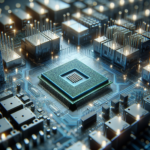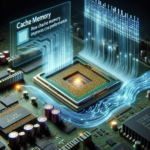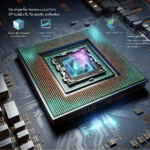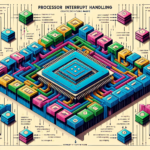The Role of CPUs in Industrial Control Systems

The Role of CPUs in Industrial Control Systems
Industrial control systems (ICS) are the backbone of modern manufacturing and production processes. These systems ensure that machinery and processes operate efficiently, safely, and reliably. At the heart of these systems lies the Central Processing Unit (CPU), a critical component that drives the functionality and performance of ICS. This article delves into the role of CPUs in industrial control systems, exploring their importance, functionality, and the advancements that have shaped their evolution.
Understanding Industrial Control Systems
What Are Industrial Control Systems?
Industrial control systems encompass a variety of control systems and instrumentation used for industrial production, including Supervisory Control and Data Acquisition (SCADA) systems, Distributed Control Systems (DCS), and Programmable Logic Controllers (PLCs). These systems are designed to monitor and control industrial processes, ensuring optimal performance and safety.
Components of Industrial Control Systems
ICS typically consist of the following components:
- Sensors: Devices that collect data from the environment or machinery.
- Actuators: Components that execute control actions based on CPU instructions.
- Controllers: Units that process data and make decisions, often powered by CPUs.
- Human-Machine Interfaces (HMIs): Interfaces that allow human operators to interact with the system.
- Communication Networks: Systems that facilitate data exchange between different components.
The Central Processing Unit (CPU)
What Is a CPU?
The Central Processing Unit (CPU) is the primary component of a computer that performs most of the processing inside a system. It executes instructions from programs, performs calculations, and manages data flow within the system. In the context of industrial control systems, the CPU is responsible for processing data from sensors, executing control algorithms, and sending commands to actuators.
Key Functions of CPUs in Industrial Control Systems
CPUs in industrial control systems perform several critical functions:
- Data Processing: CPUs process data from sensors to monitor the state of the system and make real-time decisions.
- Control Execution: CPUs execute control algorithms to maintain desired system states, such as temperature, pressure, or speed.
- Communication: CPUs facilitate communication between different components of the ICS, ensuring coordinated operation.
- Data Logging: CPUs record data for analysis, troubleshooting, and optimization of industrial processes.
- Safety Management: CPUs implement safety protocols to prevent accidents and ensure the safe operation of machinery.
Types of CPUs in Industrial Control Systems
Microcontrollers
Microcontrollers are compact integrated circuits designed to perform specific control tasks. They are commonly used in embedded systems within industrial control systems. Microcontrollers typically include a CPU, memory, and input/output peripherals on a single chip, making them ideal for applications requiring real-time control and low power consumption.
Programmable Logic Controllers (PLCs)
PLCs are specialized industrial computers designed for controlling manufacturing processes. They are highly reliable and can operate in harsh industrial environments. PLCs use CPUs to execute control programs written in ladder logic or other programming languages. They are widely used in automation, assembly lines, and process control.
Industrial PCs
Industrial PCs are robust computers designed for industrial applications. They offer higher processing power and flexibility compared to microcontrollers and PLCs. Industrial PCs use CPUs to run complex control algorithms, data analysis, and visualization tasks. They are often used in SCADA systems and other applications requiring high computational capabilities.
Advancements in CPU Technology for Industrial Control Systems
Increased Processing Power
Modern CPUs offer significantly higher processing power compared to their predecessors. This allows industrial control systems to handle more complex control algorithms, process larger volumes of data, and perform real-time analysis. The increased processing power also enables the integration of advanced technologies such as artificial intelligence and machine learning into ICS.
Energy Efficiency
Energy efficiency is a critical consideration in industrial control systems, especially in applications requiring continuous operation. Advances in CPU technology have led to the development of energy-efficient processors that consume less power while delivering high performance. This reduces operational costs and minimizes the environmental impact of industrial processes.
Enhanced Reliability
Reliability is paramount in industrial control systems, where failures can lead to costly downtime and safety hazards. Modern CPUs are designed to operate reliably in harsh industrial environments, with features such as error-correcting code (ECC) memory, redundant components, and robust thermal management. These advancements ensure that CPUs can withstand the demands of industrial applications.
Integration with IoT and Industry 4.0
The advent of the Internet of Things (IoT) and Industry 4.0 has transformed industrial control systems. CPUs now play a crucial role in enabling connectivity and data exchange between devices, systems, and the cloud. This integration allows for real-time monitoring, predictive maintenance, and optimization of industrial processes, leading to increased efficiency and productivity.
Challenges and Considerations
Security
Security is a major concern in industrial control systems, as cyberattacks can disrupt operations and compromise safety. CPUs must incorporate robust security features to protect against threats such as malware, unauthorized access, and data breaches. This includes hardware-based security measures, secure boot processes, and encryption technologies.
Scalability
Industrial control systems must be scalable to accommodate changing production demands and technological advancements. CPUs should support scalability by allowing for easy upgrades and integration with new components. This ensures that ICS can adapt to evolving requirements without significant disruptions.
Real-Time Performance
Real-time performance is critical in industrial control systems, where delays can lead to suboptimal performance or safety risks. CPUs must deliver consistent and predictable performance to meet real-time requirements. This involves optimizing processing speed, minimizing latency, and ensuring timely execution of control tasks.
FAQ
What is the role of a CPU in an industrial control system?
The CPU in an industrial control system processes data from sensors, executes control algorithms, facilitates communication between components, logs data for analysis, and implements safety protocols. It is the central component that drives the functionality and performance of the system.
What types of CPUs are used in industrial control systems?
Common types of CPUs used in industrial control systems include microcontrollers, Programmable Logic Controllers (PLCs), and industrial PCs. Each type has its own advantages and is suited for different applications within ICS.
How have advancements in CPU technology impacted industrial control systems?
Advancements in CPU technology have led to increased processing power, energy efficiency, enhanced reliability, and integration with IoT and Industry 4.0. These improvements have enabled more complex control algorithms, real-time data analysis, and optimized industrial processes.
What are the key considerations when selecting a CPU for an industrial control system?
Key considerations include processing power, energy efficiency, reliability, security features, scalability, and real-time performance. The selected CPU should meet the specific requirements of the industrial application and be capable of operating in harsh environments.
How do CPUs contribute to the security of industrial control systems?
CPUs contribute to the security of industrial control systems by incorporating hardware-based security measures, secure boot processes, and encryption technologies. These features protect against cyber threats, unauthorized access, and data breaches, ensuring the safe and reliable operation of the system.
Conclusion
The role of CPUs in industrial control systems is indispensable. As the central component responsible for data processing, control execution, communication, and safety management, CPUs drive the functionality and performance of ICS. Advancements in CPU technology have significantly enhanced the capabilities of industrial control systems, enabling more complex and efficient operations. However, challenges such as security, scalability, and real-time performance must be carefully considered when selecting and implementing CPUs in industrial applications. As technology continues to evolve, CPUs will play an increasingly critical role in shaping the future of industrial control systems, driving innovation and efficiency in manufacturing and production processes.




